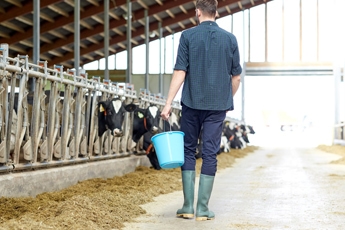Personal injury claims related to farm work arise when workers are hurt by high-impact kicks from cows, strenuous lifting, accidental falls, machinery malfunctions, and unsanitary conditions. Just as other injury cases, these claims also involve medical record analysis and review. In this blog, we will consider injuries that occur in dairy farms and how to minimize them. Workers injured while doing farm or dairy work may be entitled to workers’ compensation.
Fatal injuries on dairy farms result from vehicles, dams, tractors, whereas non-fatal injuries occur from cattle, dairy plant, gates/fences, and hot water. Studies show that the major injuries are fractures, burns, cuts and sprains, and the body parts most susceptible to injury are fingers, hands, eyes, forearms, and the back. Why do such injuries occur? In a dairy farm, workers are in contact with animals for extended periods of time on a daily basis. Most of these injuries occur when animals step on, kick, or fall on farm workers. Mauling by dairy bulls is also a common occurrence. It is important that workers are trained about proper livestock handling practices, and reminded that dairy animals are able to see almost all the way around themselves.
Here are some strategies to adopt to reduce the risk of personal injury on a dairy farm.
- Reduce opportunities for contact with cattle by improving either the design of the dairy or cattle-handling practices.
- Train the workers on how to approach an animal from the side, while using verbal signals in a way that doesn’t threaten the animal and puts it on its guard.
- Workers must understand and use the “flight zone” (the personal space of the animal) in the proper manner. This will help move the animal in a preferred direction. If you enter the flight zone, the animal will move away from you. A wild animal typically has a larger flight zone whereas a domesticated dairy cow will have a very minimal flight zone, and so it will be difficult to move the latter.
- Do not shout loudly at animals because they tend to become stressed and become more difficult to handle. It is important also to remember that loud noises such as loud exhaust from air cylinders, banging gates, gunshot sounds, and so on may frighten animals.
- Animals that are isolated are more nervous and agitated. So it is best to have another companion animal near when working with an animal.
- Watch for warning signs of an agitated animal such as pinned ears, raised head, raised tails, raised hair on back, bared teeth, pawing the ground, snorting or excessive bawling.
- Take care not to push an animal when it has no place to move. It is best to touch animals gently rather than pushing or bumping them.
- Remember that dairy bulls are dangerous at all times. Ensure that workers have proper equipment and facilities when handling them.
- Breeding animals are sensitive and protective of their young, and can hurt you.
- Ensure personal hygiene when handling farm animals because humans can contract diseases (rabies, ringworm, leptospirosis, anthrax, bovine tuberculosis) from livestock. Disease risk can be minimized by using eye wash stations, gloves, and splash guards along with good personal hygiene. Make sure that dead animals are disposed of promptly.
- Proper livestock handling equipment such as treatment pens, halters, head-gates, man-gates in pens, working chutes, anti-kicking devices, hip lifters or cattle lifters should all be made available, and should function well.
- It is important to design the facility properly, including gate placement, spacing between railings, or boards and lighting, and pen size.
Workers filing personal injury claims may be entitled to compensation for injuries sustained and damages. Damages could include general damages that are non-financial damages such as pain and suffering from the injury, and special damages that include out-of-pocket expenses resulting from the injury. The latter would include lost wages, medical expenses, and travel costs. As providers of medical review solutions to personal injury lawyers, we understand that legally employed farm workers are entitled to claim workers’ compensation for workplace injuries and illnesses.




